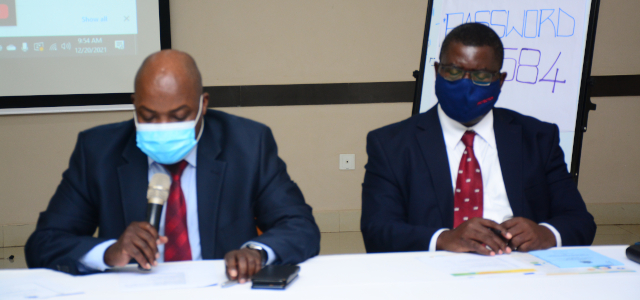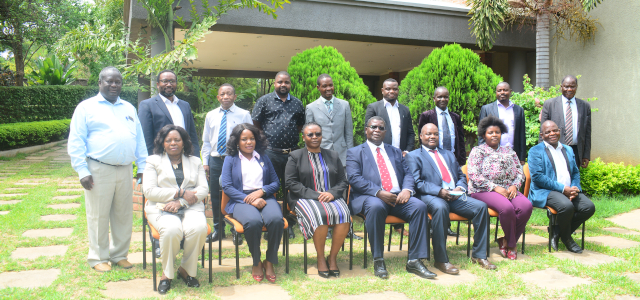In officially opening the dialogue,Mr H Namainja, Director for Administration in the Ministry of Forestry and Natural Resources, drew the participants attention to the increased demand for energy, water and food, particularly in developing countries, owing to competing needs for limited resources, rapid economic growth, high population growth, urbanization and resource degradation, exacerbated by climate change.
"These competing needs for the little resources surely threaten water, energy, and food security," he said. He was speaking on behalf of Dr Yanira Ntupanyama, Principal Secretary in the Ministry of Forestry and Natural Resources. "It is against this background that the WEF Nexus paradigm was birthed in order to sustainably manage and leverage the limited existing resources."

Mr Prince Mleta, Deputy Director for Water Resources and Mr H Namainja, Director for Administration in the Ministry of Forestry and Natural Resources
Mr Namainja pointed out the importance of adopting the WEF Nexus approach in the SADC region, noting the adoption of Decision 30 by SADC Ministers of Energy and Water during their Joint Meeting held Malawi on 2 December 2021, which urged Member States to support and participate actively in the Water, Energy, and Food (WEF) national dialogues, as well as the regional WEF Nexus training scheduled for 2022.
The WEF Nexus approach in the SADC region is being realized through the SADC Nexus Dialogue Project "Fostering Water, Energy and Food Security Nexus Dialogue and Multi-Sector Investment in the SADC Region" supported by the European Commission as part of the global 'Nexus Regional Dialogues Programme". The overall objective of the project is to support the transformation required to meet increasing water, energy, and food security demand in the context of climate change in the SADC Region, through the development of an integrated nexus approach.
The SADC Nexus Dialogue Project began in 2017 and is being implemented in two phases. Phase I of the Nexus Dialogues Programme ran from 2017-2019 and was aimed at helping regional organizations, and their member states to apply a nexus approach in formulating multi-sector policy recommendations, strategies, action plans and investment programmes. Phase I also identified concrete investment projects - with a focus on multi-purpose water infrastructure. Phase II of the project has a duration of 3 years, commencing in 2020 until 2023. This phase consolidates and builds on the achievements of the first phase, with the overall objective being to institutionalize the WEF Nexus approach at regional and national governance structures and investment decisions for water, energy, and food security in the SADC region.
In presenting the WEF Nexus background paper for Malawi, the Malawi WEF Nexus Expert, Prof Geoffrey Chavula, pointed to the close link between the WEF Nexus and the Malawi Growth and Development Strategy III, Sustainable Development Goals (SDGs) and Malawi 2063, which makes it imperative for Malawi to embrace this concept as a key developmental tool. He also familiarised the dialogue with existing key policies that would provide an enabling environment for the implementation of WEF Nexus projects in Malawi.
"Malawi has a wide array of policies that would guide and drive the WEF Nexus in line with Malawi's development agenda," he said. "These include but are not limited to the Malawi Growth and Development Strategy III (2017-2022), United Nations (UN) Sustainable Development Goals, Malawi 2063, National Water Resources Policy (2021), National Energy Policy (2018) National Agriculture Policy (2016), and other pertinent policies and associated regulatory frameworks".
Prof Chavula outlined the constraints to the implementation of the WEF Nexus approach in Malawi. These include inadequate funding, lack of harmonization of sectoral policies about water-energy-food, poor functionality of water supply and energy generation facilities, environmental degradation, inadequate capacity, and a weak regulatory framework. Once these constraints are dealt with, an enabling environment will have been created.
Through a participatory approach, the representatives from the water, energy and agriculture sectors shortlisted five WEF nexus investment projects for potential screening through the WEF Investments Screening Tool and support to bankability under the Africa Water Investment Program (AIP) Sustainable Development Goals (SDG) Investments Programme, and other regional and continental initiatives. These shortlisted projects include the Mpatamanga Hydro-power – 350MW located between Tedzani and Kapichira, Malawi Watershed Services Improvement Project (MWASIP) and the Songwe River Basin Development Programme, Agriculture Sector Wide Approach (ASWAp II).
